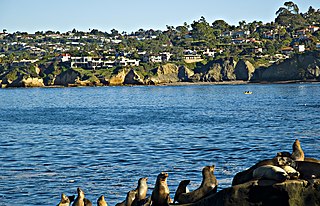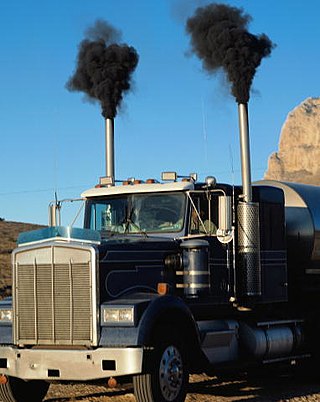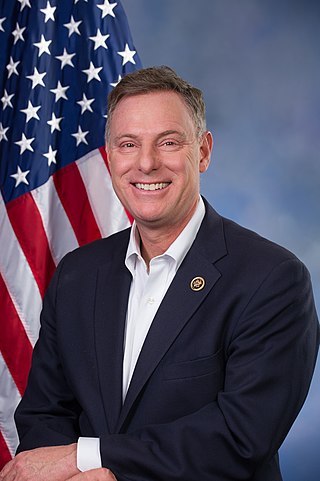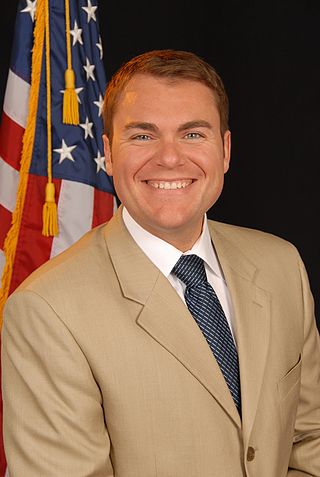Related Research Articles

San Diego is a city on the Pacific coast of Southern California, immediately adjacent to the Mexico–United States border. With a population of over 1.3 million residents, it is the eighth-most populous in the United States and the second-most populous in the state of California, after Los Angeles. San Diego is the seat of San Diego County, which has a population of nearly 3.3 million people. It is known for its mild year-round Mediterranean climate, extensive beaches and parks, long association with the United States Navy, and recent emergence as a healthcare and biotechnology development center.

In economics, an externality or external cost is an indirect cost or benefit to an uninvolved third party that arises as an effect of another party's activity. Externalities can be considered as unpriced components that are involved in either consumer or producer market transactions. Air pollution from motor vehicles is one example. The cost of air pollution to society is not paid by either the producers or users of motorized transport to the rest of society. Water pollution from mills and factories is another example. All (water) consumers are made worse off by pollution but are not compensated by the market for this damage. A positive externality is when an individual's consumption in a market increases the well-being of others, but the individual does not charge the third party for the benefit. The third party is essentially getting a free product. An example of this might be the apartment above a bakery receiving some free heat in winter. The people who live in the apartment do not compensate the bakery for this benefit.

Rancho San Diego is a census-designated place (CDP) in the East County region of San Diego County, California. The population was 21,858 at the 2020 census, up from 21,208 at the 2010 census. The area was developed as subdivisions beginning in the 1970s.
Social cost in neoclassical economics is the sum of the private costs resulting from a transaction and the costs imposed on the consumers as a consequence of being exposed to the transaction for which they are not compensated or charged. In other words, it is the sum of private and external costs. This might be applied to any number of economic problems: for example, social cost of carbon has been explored to better understand the costs of carbon emissions for proposed economic solutions such as a carbon tax.

The cost of living is the cost of maintaining a certain standard of living for an individual or a household. Changes in the cost of living over time can be measured in a cost-of-living index. Cost of living calculations are also used to compare the cost of maintaining a certain standard of living in different geographic areas. Differences in the cost of living between locations can be measured in terms of purchasing power parity rates. A sharp rise in the cost of living can trigger a cost of living crisis, where purchasing power is lost and, for some people, their previous lifestyle is no longer affordable.

June Gloom is a mainly Southern California term for a weather pattern that results in cloudy, overcast skies with cool temperatures during the late spring and early summer. While it is most common in the month of June, it can occur in surrounding months, giving rise to other colloquialisms, such as “Graypril,” “May Gray,” “No-Sky July,” “Fogust”, and “Summer Bummer”. Low-altitude stratus clouds form over the cool water of the California Current, and spread overnight into the coastal regions of California.

Randall Harold "Duke" Cunningham is an American former politician, Vietnam War veteran and fighter ace. Cunningham served as a Republican member of the U.S. House of Representatives from California's 50th district from 1991 to 2005, and later served prison time for accepting bribes from defense contractors.

Diane Lynn Harkey is an American politician who served as a member of the California State Board of Equalization, representing its fourth district from 2015 to 2019. A member of the Republican Party, she was previously elected to the Dana Point City Council (2004–2008), including a stint as Mayor of Dana Point (2007–2008), as well as the California State Assembly (2008–2014). She was a Republican candidate for California's 49th congressional district seat in the 2018 election, losing to Democrat Mike Levin.
The climate of San Diego, California is classified as a hot-summer Mediterranean climate. The basic climate features hot, sunny, and dry summers, and cooler, wetter winters. However, San Diego is much more arid than typical Mediterranean climates, and winters are still dry compared with most other zones with this type of climate. The climate at San Diego International Airport, the location for official weather reports for San Diego, as well as the climate at most beach areas, straddles the border between BSh and BSk due to the mild winters and cool summers in these locations.

Joel Anderson is an American politician serving as a member of the San Diego County Board of Supervisors. A Republican, he is a former California state senator, assemblyperson, and board member of a municipal water district. During his time in the Legislature, Anderson served on the board of the American Legislative Exchange Council (ALEC) as California state chair.

Nuclear power construction costs have varied significantly across the world and over time. Large and rapid increases in costs occurred during the 1970s, especially in the United States. Recent cost trends in countries such as Japan and Korea have been very different, including periods of stability and decline in construction costs.

Scott Harvey Peters is an American lawyer and politician serving as the U.S. representative from California's 50th congressional district since 2023, previously representing the 52nd congressional district from 2013 to 2023. His district includes both coastal and central portions of San Diego, as well as the suburbs of Poway and Coronado.

Community Choice Aggregation (CCA), also known as Community Choice Energy, municipal aggregation, governmental aggregation, electricity aggregation, and community aggregation, is an alternative to the investor-owned utility energy supply system in which local entities in the United States aggregate the buying power of individual customers within a defined jurisdiction in order to secure alternative energy supply contracts. The CCA chooses the power generation source on behalf of the consumers.

Carl David DeMaio is an American politician from San Diego, California. DeMaio hosts a radio show on NewsRadio 600 KOGO. He also founded and served as Chairman of Reform California, a conservative political action committee.

San Diego County, officially the County of San Diego, is a county in the southwestern corner of the U.S. state of California. As of the 2020 census, the population was 3,298,634; it is the second-most populous county in California and the fifth-most populous in the United States. Its county seat is San Diego, the second-most populous city in California and the eighth-most populous in the United States. It is the southwesternmost county in the 48 contiguous United States, and is a border county. It is home to 18 Native American tribal reservations, the most of any county in the United States. There are 16 military installations of the U.S. Navy, U.S. Marine Corps, and U.S. Coast Guard in the county.
Green affordable housing is reasonably priced housing that incorporates sustainable features. The phenomenon has become increasingly common in all over the world as climate change and the cost of housing become alarming issues. For example, the United States adopted state and local policies that favor or require green building practices for publicly owned or funded buildings. Potential benefits of green affordable housing include lower energy cost burden and improved health. One challenge to green affordable housing is the tendency to prioritize short-term costs over long-term benefits, leading to higher upfront cost. The challenge for green housing advocates is to see to the life cycle cost of the building. Many affordable housing projects already find it a challenge to raise capital to finance basic affordable housing. This challenge is compounded by the phenomenon of urban greening and environmental gentrification, which can drive up housing prices and becomes a challenge for green affordable housing. Green affordable housing has taken form in traditionally wooden homes, green homes and most recently with 'upcycling' shipping containers.
Randall Roth is a former law professor at the William S. Richardson School of Law at University of Hawaiʻi at Mānoa and a trusts and estates expert. The Honolulu Star-Bulletin identified him as one of the "100 Who Made A Difference" in the state since statehood, and Honolulu Magazine recognized his work, specifically on Broken Trust, as one of the "50 turning points" in the state's history.

Bay Terraces is a hilly urban neighborhood in the southeastern part of San Diego, California, United States. A composite of North Bay Terrace and South Bay Terrace, it is bordered by Skyline to the north, Paradise Hills to the southwest, Alta Vista, South Encanto and National City to the west. The southern end of the neighborhood is bordered by State Route 54 and Bonita. The neighborhood generally includes the ZIP Codes 92114 and 92139 and as such, parts of the area have often been incorrectly referred to as either "Paradise Hills" or "Skyline Hills" due to its proximity and overlapping ZIP Codes. Nevertheless, Bay Terraces is the largest neighborhood in the Skyline-Paradise Hills Community Planning Area.

The economy of San Diego is the 17th largest among metro areas in the United States and 4th largest among California's metro areas, with a gross domestic product in Greater San Diego of $206 billion in 2014. The economy is also part of the San Diego–Tijuana international metropolitan conurbation. The largest sectors of San Diego's economy are defense/military, tourism, international trade, and research/manufacturing, respectively. In 2014, San Diego was designated by a Forbes columnist as the best city in the country to launch a small business or startup company.

Since about 1970, California has been experiencing an extended and increasing housing shortage, such that by 2018, California ranked 49th among the states of the U.S. in terms of housing units per resident. This shortage has been estimated to be 3-4 million housing units as of 2017. As of 2018, experts said that California needs to double its current rate of housing production to keep up with expected population growth and prevent prices from further increasing, and needs to quadruple the current rate of housing production over the next seven years in order for prices and rents to decline.
References
- ↑ Dixon, John A. & Sherman, Paul B. (1990). Economics of protected areas: a new look at benefits and costs. Island Press. p. 36. ISBN 1-55963-032-9 . Retrieved April 11, 2011.
- ↑ "Sunshine tax: Drivers suffer the mistakes of politicians". San Diego Union-Tribune. March 15, 2007. Retrieved April 11, 2011.
- ↑ Smith, James R. Living and Retiring in Hawaii: The 50th State in the 21st Century
- 1 2 Peter S. Adler, Joanne Punu, Randall W. Roth and Eric Yamamoto, "What is the paradise tax and what are its implications?" in Randall W. Roth, ed., The Price of Paradise, Volume II, Honolulu: Mutual Publishing, 1993
- ↑ Horn, Jonathan (October 26, 2012). "The sunshine tax: Just how much is it?". San Diego Union Tribune. Retrieved 23 January 2014.
- ↑ "Intellectual labor is her life's work". Sarasota Herald-Tribune. February 26, 2007. Retrieved April 11, 2011.
- ↑ Melcher, Michael F. (2007). The creative lawyer: a practical guide to authentic professional satisfaction. Chicago: ABA Publishing. p. 154. ISBN 978-1-59031-843-0 . Retrieved April 11, 2011.
- ↑ Jon Manchester (2009-07-09). "Some Fuel for Thought". Kelowna Daily Courier, via Wayback Machine. Archived from the original on 2011-09-27. Retrieved 2011-07-03.
- ↑ The Sunshine Tax, M is for Money, via Wayback Machine, September 14, 2009